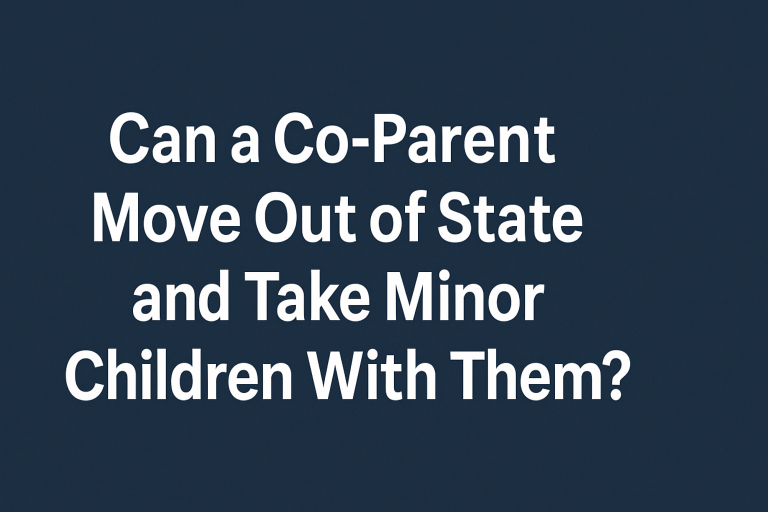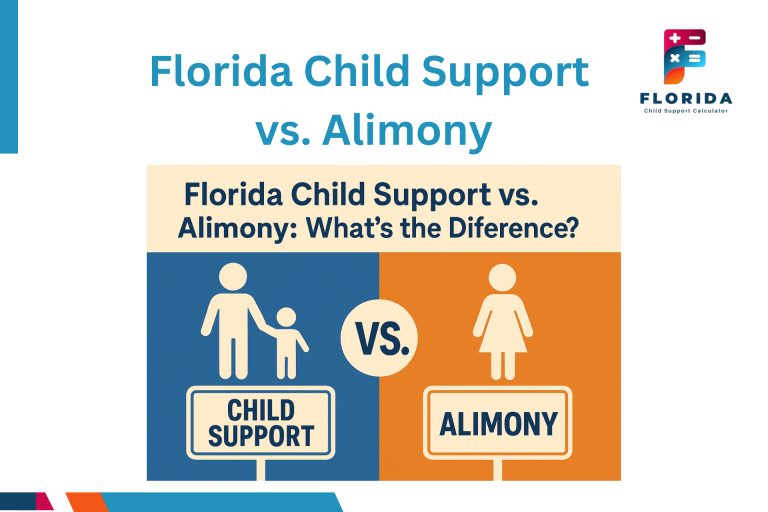What Happens If One Parent Moves Out of State
What if your co-parent is moving out of state? Sounds scary, right? One minute you’re sharing pickup duty, the next, bam! They’re talking about new schools, new jobs, and taking your kid along for the ride. But here’s the deal: they can’t just pack up and vanish without following the rules. Whether you’re wondering about Florida’s child custody guidelines or need to understand what judges consider during relocation cases, we’ve got you covered.

This guide breaks it down into plain English, with no legal mumbo jumbo. By the end, you’ll know what’s allowed, what’s not, and what to do if things go sideways. So, buckle up, we’re taking this custody rollercoaster one smooth turn at a time.
Can a Co-Parent Move Out of State Without the Kids?

Sometimes, your co-parent doesn’t want to take the kids; they just want to leave the state. But hold on, even if they’re not dragging suitcases full of toys, the court still wants to know. A parent can usually move without court approval if they’re not relocating the children. But they may still need to update the parenting plan, especially if the move affects visitation.
For example, if your current arrangement involves frequent drop-offs, moving hundreds of miles away may call for a change. These things matter when courts decide on future arrangements and stability. In Florida, this can also affect how child support is calculated based on time-sharing percentages.
And yes, when distance makes parenting harder, some parents might revisit legal matters like modifying child support agreements, especially if the out-of-state move creates an imbalance.
Can a Co-Parent Move Out of State and Take Minor Children With Them?

This one’s a biggie. When your co-parent wants to move out of state with the kids, they can’t just do it like a casual weekend trip. Court permission is usually required, especially if you both share custody. Why? Because such a move can completely change how both parents spend time with the child.
In Florida, any move beyond 50 miles for more than 60 days qualifies as “relocation” under the law. So, if your ex tries to say, “I’m just going to Mom’s for a while,” and then enrolls your child in a new school? That’s a red flag. Courts look closely at the child’s best interest, not the convenience of the moving parent.
If you’re stuck in this situation, you’ll want to understand how Florida judges consider relocation factors before you react emotionally. Also, make sure the co-parent doesn’t bypass the system. Filing official parenting forms and notices protects your rights and your child’s stability.
What Factors Will the Court Consider in a Move-Away Case?

The court doesn’t flip a coin when deciding if a parent can move away with the kids. Instead, they follow a checklist kind of like a report card for grown-ups. Below is a table showing the key factors courts usually consider:
| Factor | What It Means |
|---|---|
| Child’s stability | Will the move affect school, friends, or routines? |
| Parent’s motivation | Is the move for a job, safety, or just a sudden whim? |
| Visitation possibilities | Can the other parent still be involved meaningfully? |
| Education quality | Will the child get better or worse learning opportunities? |
| Emotional development | Will this move affect mental health or comfort? |
In Florida, courts also consider financial balance and parenting time, which means knowing how income affects child support is also important during these cases. If a move seems unfair to one parent, the court may even modify the entire arrangement to keep things balanced.
Sometimes, even with the best reasons, a move can be denied. That’s why knowing how custody and finances are balanced during divorce is key to being prepared in court.
What Do I Do If My Co-Parent Moves Out of State With My Kids Without Permission?

If your co-parent suddenly moves out of state with your child and doesn’t ask for permission, don’t panic, but don’t wait either. This can be a serious legal issue, and you have the right to take action.
Start by getting legal advice fast. When a parent leaves the state without following custody rules, it might be seen as custodial interference. You can ask the court for help right away. In some cases, a judge may even grant emergency custody.
These situations can also affect finances and support. That’s why it’s smart to know how child support is enforced when custody changes. And if you’re unsure what to do first, you can explore a step-by-step guide on child support laws in Florida. Keep records, stay calm, and act quickly.
What If They Say It’s a Vacation… But Don’t Come Back?

It starts with a friendly “We’re just visiting Grandma,” but then days turn into weeks, and suddenly, they’re enrolling your child in school out of state. That’s not a vacation anymore. If your co-parent refuses to return, you need to treat it seriously.
Courts don’t like surprises like these. Taking a child across state lines under false claims could lead to legal trouble. If your parenting plan was violated, you may need to file for enforcement or even a custody change.
Some parents have found that when this happens, the court may revisit who has legal custody in Florida. And if your financial responsibilities are also being messed with, consider whether a child support review is needed. Trust matters in co-parenting, but when it’s broken, the law has to step in.
How to Co-Parent Across State Lines (If the Move Is Legal)

If your co-parent has moved legally and everything’s approved, you’re still in the game, just playing long-distance now. Co-parenting across state lines takes planning, patience, and the right tools.
Try using co-parenting apps like OurFamilyWizard or even Google Calendar to keep everyone on the same page. Set video call routines and travel dates early so your child doesn’t feel caught in the middle.
Long-distance parenting may also mean changes to the support arrangement. If parenting time has shifted, Florida’s child support formula might need to be adjusted. And if you’re worried about keeping parenting fair from far away, it helps to understand what influences child support decisions when families live apart.
Being far doesn’t mean being out. With good planning, you can still stay close and keep parenting strong, even across state lines.
When and How Courts Change Custody After a Move

Big moves can mean big changes, even in child custody. When a parent moves out of state, the court might review everything to protect the child’s routine and connection with both parents.
A move without permission could lead to temporary custody changes, especially if the other parent is left out. In Florida, courts focus on what’s best for the child. If the relocation causes trouble, judges might even modify the parenting plan and support orders.
Sometimes, a parent’s failure to follow custody rules can lead to legal action. That’s why it helps to understand how Florida’s custody system works when separation turns into distance.
Real Parent Experiences With Out-of-State Moves

This isn’t just law; it’s real life. Many parents share stories of confusion, stress, and sudden court dates when one co-parent tries to relocate. Some say their parenting rights disappeared overnight.
On Reddit and forums, one dad said his ex “moved with the kids for a job offer” but never filed for permission. The court ended up reversing custody. Others talked about feeling helpless, but found relief after filing for emergency hearings and updating their plans.
Understanding your legal options if a co-parent moves suddenly can save a lot of stress. And if it also affects your financial plan, looking at how child support gets recalculated helps you stay ahead.
FAQs About Moving Out of State With a Child
Can a co-parent move to another state without telling me?
Nope. If there’s a custody order in place, they can’t just disappear. Even if they’re not taking the child, some states still expect the parent to notify the court. In Florida, major changes must be communicated, especially if they affect the parenting schedule. If this happens to you, get familiar with your legal rights fast.
What if they move with my child and don’t come back?
That’s serious. If your co-parent says it’s just a “visit” but refuses to return, it might count as custodial interference. You can request emergency custody or court enforcement. Many parents have had to deal with this, and understanding how courts handle child relocation cases helps you react calmly and quickly.
Will I lose custody if I move out of state?
Moving doesn’t mean losing custody, but how you move matters. If you move legally, with court approval and a clear plan for parenting time, you can often keep your custody rights. But skipping steps or ignoring the other parent’s rights might hurt your case. You might need to update your parenting or support plan after a move.
Who pays for travel if one parent moves away?
It depends. Sometimes the court makes the moving parent pay, especially if the move makes visits harder. Other times, costs are shared. If you’re revisiting this topic, it’s smart to look into how child support is handled in Florida, because travel might shift financial responsibilities, too.
Can a judge stop the move?
Yes. If the judge believes the move will hurt the child’s routine or relationship with the other parent, the court can deny it. Judges always use the best interest of the child standard. That’s why understanding how Florida courts make custody decisions can help you prepare your case.
Final Thoughts: Protecting Your Rights and Your Kids
Let’s be real, co-parenting isn’t always easy. But when one parent moves far away, the impact on kids can be deep. That’s why staying informed and prepared matters most.
Always follow the court process. Whether you’re filing updated forms in Florida or checking if custody terms still fit, don’t guess; take action. Your child’s stability depends on it.
And remember, even if things feel one-sided now, the law gives both parents a voice. From support changes to parenting plans, the court is there to keep it fair, if you know how to ask.





